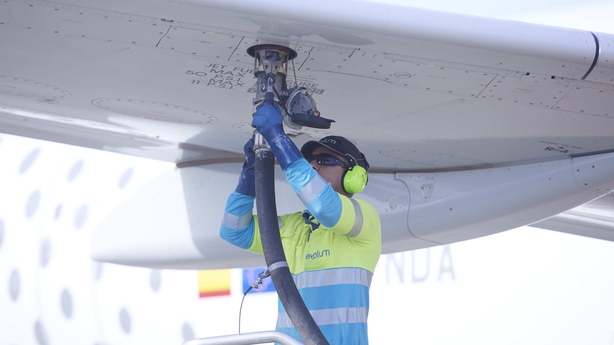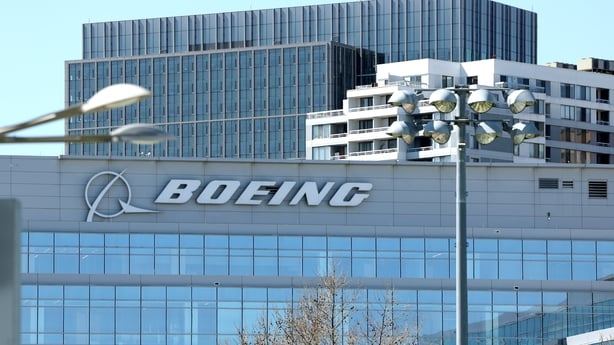The chief executive of the International Air Transport Association (IATA) has said the passenger cap at Dublin Airport has become a joke outside of Ireland.
Willie Walsh said the restriction on the growth of passenger numbers at the airport is "very disappointing, very frustrating."
Mr Walsh said Dublin Airport is not capacity constrained, as it has plenty, but is restricted by a planning restriction that is completely artificial in terms of available infrastructure.
"t has become a joke. Outside of Ireland this is a joke," Mr Walsh said at an event at the Institute of International and European Affairs in Dublin today.
"I speak to international airlines who want to serve the Irish market, they want to serve it through Dublin," he said.
"They are not going to fly to Shannon and Cork and they are absolutely crystal clear about that. They want to serve the Irish market. For them Dublin is the Irish market. And they can't because we have this restriction," he said.
"Quite honestly, this is something that could only happen in Ireland and it is sad to see it," he added.
He said Dublin Airport has "huge demand", but the capacity is not going to be provided because of planning rules related to road access limits from 20 years ago when the situation has completely changed.
Mr Walsh said the Government will have to have to intervene if there is to be a long-term resolution of the matter, which is needed.
He also predicted fares in and out of Dublin Airport will increase because there will be more demand for the seats available, because of the capacity constraints.
The IATA chief said he agreed with the suggestion that Dublin Airport should be designated as strategic infrastructure for planning purposes.
He also said an infrastructure minister would be a good idea.
More generally, Mr Walsh said the industry is recovering well from Covid, but the number one item on the aviation sector's agenda is the environmental impact of aviation, which he described as "existential".
He said the industry does have a path to net zero by 2050 "but it is very complex, it is very challenging and it is extremely expensive."
Mr Walsh said Sustainable Aviation Fuel (SAF) can achieve around 65% of the required emissions abatement needed by 2050, but it is still being produced in very small quantities and needs to be scaled up.
He said a recent IATA paper had found that the differential between what kerosene will cost and what SAF will cost will be $4.7 trillion by 2050.
He added that is $174 billion a year for an airline industry that will make $30 billion this year.

He said fuel is the single biggest part of the airline industry’s cost base and this would increase the percentage of costs that it comprises to around 41% or 42%.
"So there is no way the industry is going to absorb this," he said.
"People say, well who is going to pay for this transition? And it is absolutely clear that the consumer is going to have to pay as airlines don’t have the additional scope to absorb the cost," he stated.
He added that carbon offsetting has a bad reputation and justifiably so, and most of what is presented as offsetting at present would not pass the stringent test set by a UN programme.
Mr Walsh also said he does not expect hydrogen to play a major role before 2050 and electrically propelled aircraft will be viable only for shorter regional routes that do not contribute much to the overall emissions from aviation.
He said air traffic control integration as set out under the Single European Sky plan could reduce emissions from aviation in Europe by 10% overnight and would not require massive investment or new technology.
The only thing preventing this happening is a lack of political will, added that he found it very frustrating that politicians who tell the industry it must reduce emissions are not prepared to act on this.
The IATA boss said there is not sufficient production of SAF in Europe and most airlines who are serious about using it are buying it in the US.
He said in Europe the approach is to mandate the use of SAF but "mandating the use of something that is not available is madness".
Sustainable aviation fuel represents a great opportunity for Ireland because of the abundance of renewable energy resources here," he added.
Airbus, Boeing aircraft delivery delays not improving - Walsh
Willie Walsh also said today that delivery delays from planemakers Airbus and Boeing are "massively frustrating" and are not yet getting better.
A number of Europe's leading airlines bemoaned the resulting capacity constraints at a conference in Brussels, with Ryanair saying it would have to revise down its passenger traffic estimates for next year because of the delays.
"It's massively frustrating for airline CEOs and it's having a big impact," the IATA boss said.

"It's going to be a problem I think for a number of years to come. The message I get from airline CEOs is the situation doesn't look like it's getting any worse, so it seems to have bottomed out or plateaued, but it's not yet getting better."
Boeing and Airbus have been struggling to meet delivery goals amid supply chain challenges. An ongoing strike at Boeing has raised concerns about worsening delays at the US planemaker amid a broader crisis around its safety reputation.
The European airlines urged Brussels to do more to secure a level playing field in the industry, complaining that Chinese rivals enjoy a huge cost advantage because they can fly over Russia.
A number of carriers, including IAG-owned British Airways and Lufthansa, recently cancelled their routes to Beijing as they struggle with competition from Chinese airlines on Europe-Asia routes.
Walsh, a former head of IAG, said that to the best of his knowledge, the European Union did not have any way to retaliate against Chinese carriers, for example, who are flying through Russian airspace.
"Our view, from IATA point of view, is Russian airspace should be open to everybody. This is a political issue. It's not a security or safety issue," he told Dublin's Institute of International and European Affairs.
"I can understand why the airlines are calling for it, but I can't see any particular instrument available to address that."
Additional reporting from Colman O'Sullivan and Reuters







